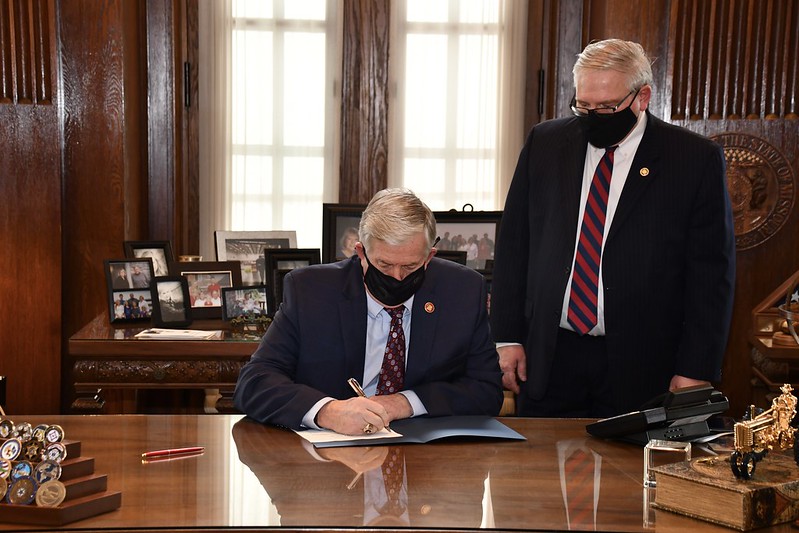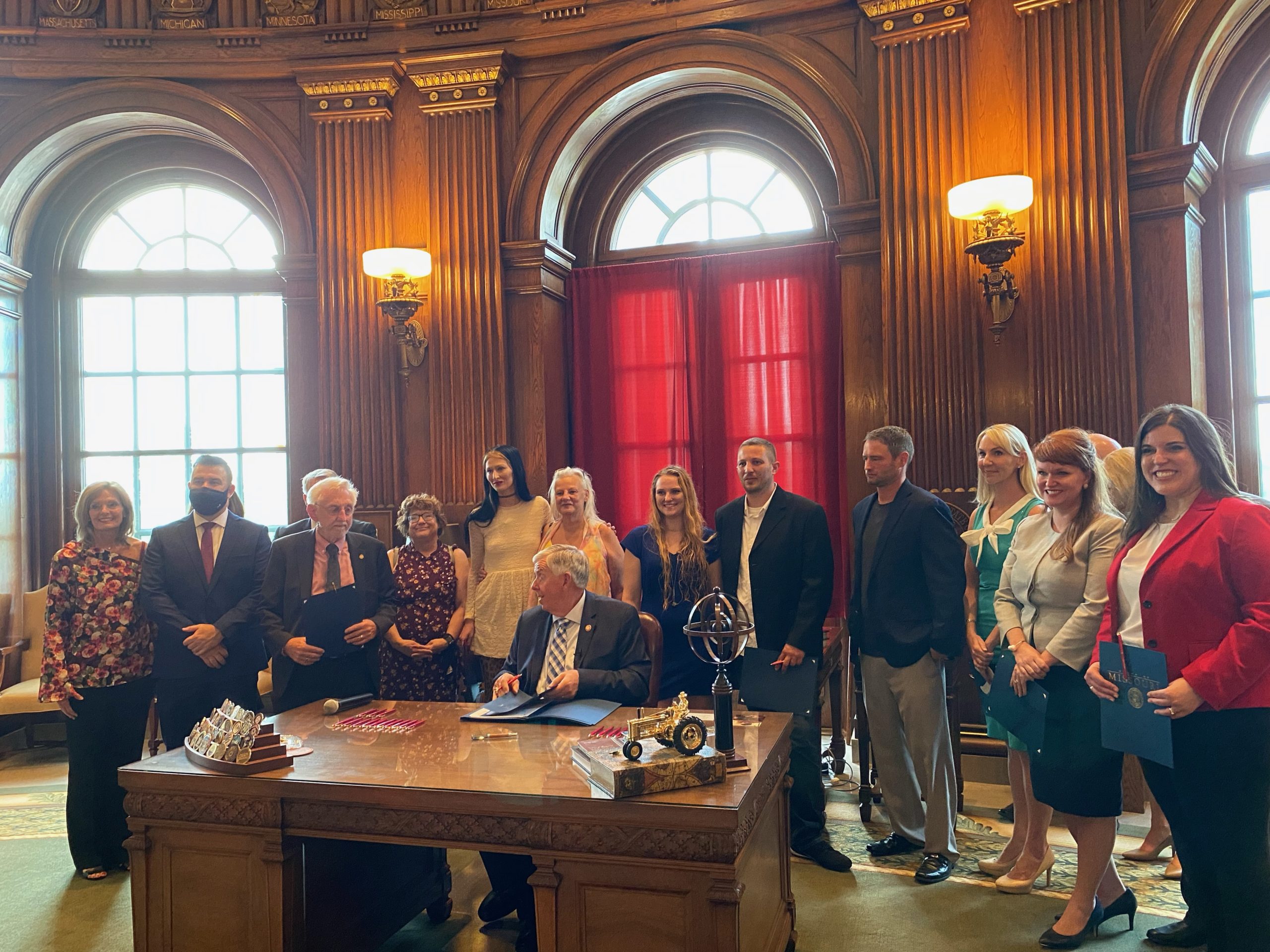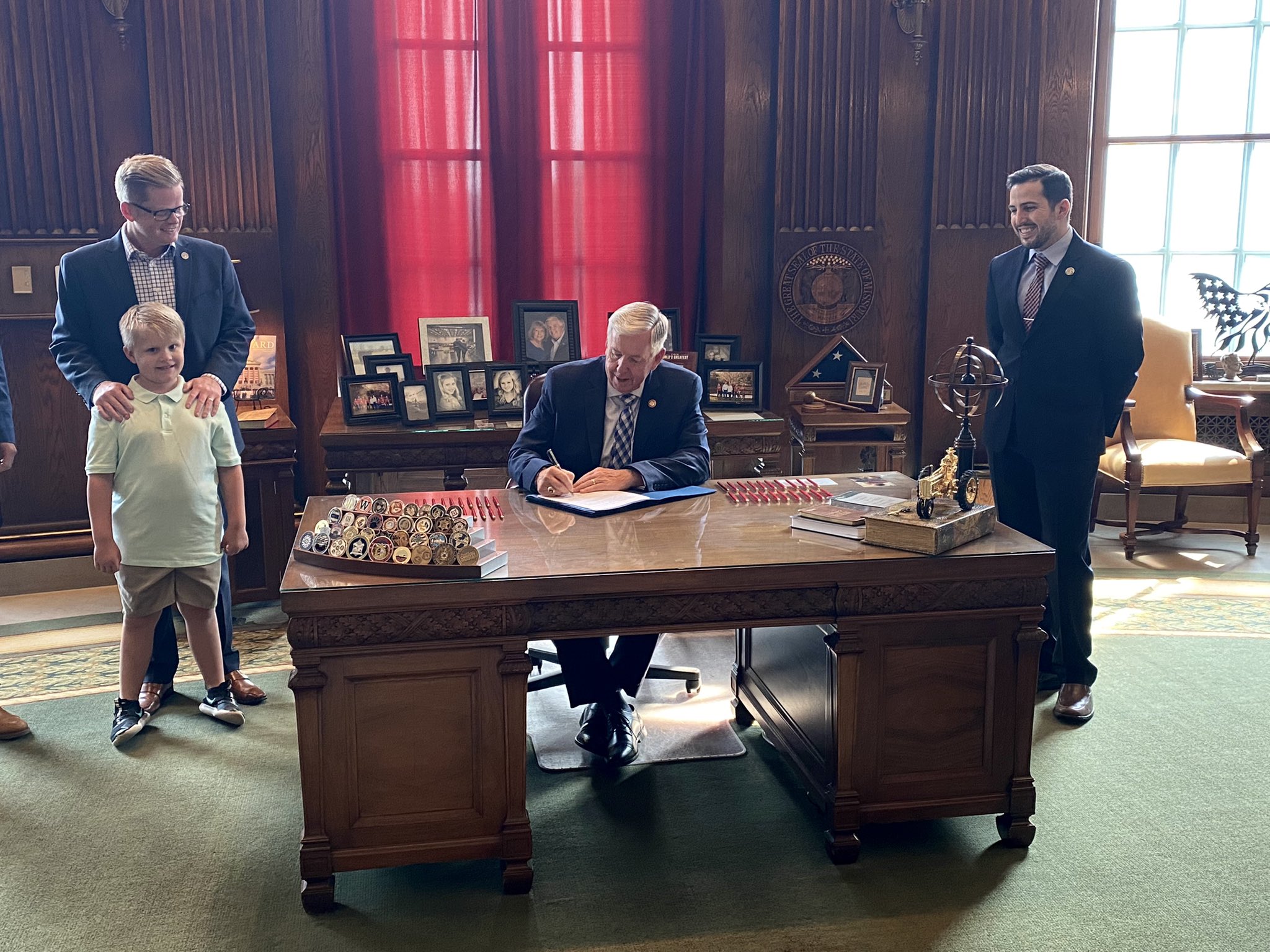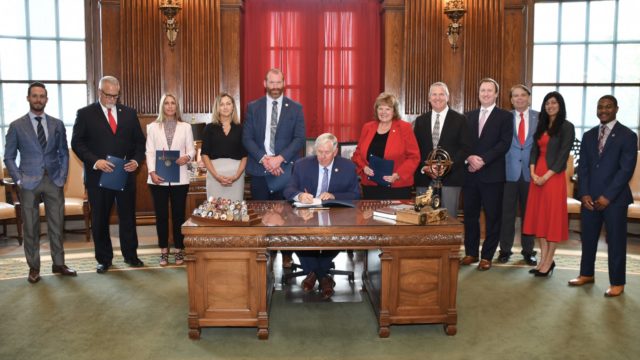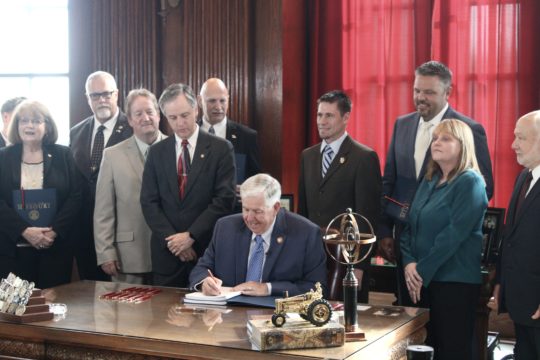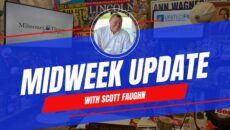JEFFERSON CITY, Mo. — Lawmakers ended the first session of the 101st General Assembly with nearly 70 bills passed.
From budgets to health care, here’s a look at what bills Gov. Mike Parson has signed so far. (This story will be updated.)
Criminal justice, police reform: July 14
From Sens. Tony Luetkemeyer and Brian Williams, SBs 53 & 60 contains a plethora of police and criminal justice reform provisions, implementing stress management programs for officers, folding pets into orders of protection, increasing the charge for doxxing a law enforcement officer, and mandating juveniles are separated from adult inmates in prison — among a myriad of other things.
One of the more well-known provisions of the bill broadens the residency requirement for Kansas City police officers to within 60 miles of the nearest city limits. It also bans respiratory chokeholds — a provision Williams passionately shepherded throughout the legislative process in the wake of George Floyd’s murder.
It also waives the fees associated with a veterans treatment court for someone who was honorably discharged from any military branch and alters orders of protection — a topic largely discussed in the legislative session.
Public safety: July 14
SB 26 is a sweeping public safety bill that covers everything from police officer rights to mental health funds. A provision added by Rep. Nick Schroer allows offenders sentenced to 15 or more years as a minor for nonviolent crimes to apply for parole after 15 years of imprisonment. The individual can continue to apply for parole every three years if denied.
The bill also completely reinstates any rights restricted due to a criminal record upon expungement. It removes language denying the right to sell liquor based solely on felony convictions and requiring employers who have liquor licenses to report employees with felony convictions to the Division of Liquor Control.
Another provision allows those with a criminal conviction to participate in the lottery but does not grant them eligibility as a lottery game retailer.
The bill requires police officers to submit to fingerprinting for the state and federal rap back program and creates a database to track use-of-force incidents involving police.
Boating restrictions: July 14
Sen. Justin Brown’s SB 49 prohibits boats from anchoring in a way that obstructs access within 100 feet of a dock without the owner’s permission and also restricts boaters from securing their craft or entering a private dock without the owner’s permission.
The law also creates the Missouri Cybersecurity Commission. The commission will operate under the Department of Public Safety (DPS) and analyze data from various state agencies, schools, and higher education institutions to identify risks and vulnerabilities in Missouri’s cyberinfrastructure.
Reform school oversight: July 14
HB 557, a bipartisan effort from Reps. Rudy Veit and Keri Ingle, requires facilities to register with the state and meet certain health and safety standards, including background checks. It also gives Missouri’s Children’s Division the ability to ask courts to order facilities to produce individuals if it determines there is a credible abuse or neglect allegation or if it’s in the best interest of the child.
The law also gives the Department of Social Services (DSS) the ability to conduct background checks of applicants for these facilities. Individuals who are registered sex offenders or have been found to be perpetrators of child abuse will be ineligible for employment.
Landowner liability protections: July 14
HB 369 from Rep. Tim Taylor creates liability protections for owners and operators of campgrounds, shielding them from being held liable for injuries on the property. Owners are exempt from liability from injuries on their property stemming from the “inherent risk of camping” unless the owner or an employee willfully contributed to the injury, disregarded dangers, or failed to post warning signs.
Missourians who own private property close to trails or parks were granted similar protections under the bill, freeing them from liability over injuries incurred by trespassers or those allowed onto the land for recreational purposes.
The bill also protects landowners or associated parties from liability for damages or injuries caused by a controlled burn or the resulting smoke. Certified burn managers are covered under the bill unless found to be negligent.
Protection of vulnerable persons: July 14
A sweeping package pertaining to vulnerable people from GOP Rep. Hannah Kelly, HB 432 includes a provision allowing victims of domestic or sexual violence in Missouri to receive unpaid time off to seek medical or mental health treatment, legal assistance, and more.
Under the language from Sen. Jill Schupp, employers with at least 50 employees must grant two workweeks of unpaid leave while those with between 20-49 employees can grant at least one workweek per year. Individuals should give at least 48 hours’ notice to take the time off (unless that is not possible) and could be asked to provide documentation such as a police report or records from an attorney or medical professional.
Purple Star Campuses: July 14
School districts that implement plans to aid military-connected children — such as establishing transition programs or recognizing military holidays — can be designated as a Purple Star Campus under Sen. Bill White’s SB 120. The Purple Star Campus program is a “key issue” for the Department of Defense’s (DOD) Defense-State Liasion Office, a spokesperson said.
The bill also moves the Missouri National Guard to its own department instead of keeping it under the Department of Public Safety’s umbrella and designates November as “Military Family Month.”
Memorial infrastructure: July 14
Sen. Steven Roberts’s SB 520 designates a portion of State Highway 180 from Interstate 170 continuing to Kienlen Avenue as the Captain David Dorn Memorial Highway. It also designates a portion of Interstate 70 from Shreve Road to Kingshighway Boulevard in St. Louis as the David Dorn Memorial Highway.
Dorn, who served with the St. Louis Metropolitan Police Department for nearly 40 years, was fatally shot while providing security for a local pawn and jewelry store in the city during the protests brought on by the murder of George Floyd last year.
The bill includes numerous other memorial designations.
Public school funds: July 14
Sen. Dan Hegeman’s SB 86 restricts schools from using public funds for political purposes, including support or opposition of ballot measures or candidates or to support political organizations. Purposeful violations of the bill are punishable as a misdemeanor.
The bill was signed alongside HB 349. Rep. Phil Christofanelli and Hegeman worked together on an amendment to SB 86 altering the new program in an effort to assuage concerns over the cost of the new system.
Missouri Empowerment Scholarships Accounts: July 14
HB 349, sponsored by Rep. Phil Christofanelli, establishes the Missouri Empowerment Scholarship Accounts Program. The program would allow taxpayers to claim a tax credit of up to 50 percent of their liability for contributions to educational assistance programs. The funds would be pooled in ESAs for students to use on tuition, textbooks, tutoring services, and other costs. The program would apply to taxpayers in areas with populations at or exceeding 30,000.
Missouri and Kentucky are the first states in the country to enact ESAs funded through tax credits, according to Forbes.
Catalytic converter theft penalties: July 13
Rep. Hardy Billington’s HB 69 altered the penalties for theft of a catalytic converter, adding it to the offense of stealing. The first offense would be a Class A misdemeanor while any subsequent theft within a decade would be a Class E felony.
Billington’s bill also includes penalties for those stealing copper and other metals.
Thefts skyrocketed across the U.S. last March as the COVID-19 pandemic gripped the country, according to a recent report from the National Insurance Crime Bureau (NICB). The same report said 17 other state legislatures considered similar actions this year.
Name, image, likeness policy: July 13
A bipartisan effort, HB 297 from Rep. Wayne Wallingford allows athletes to garner compensation for the issue of their name, image, and likeness rights as well as athletic reputation without hindering their ability to fully participate in athletics or receive grants and stipends. Additionally, it allows college athletes to obtain professional representation from agents or attorneys.
The bill prevents student-athletes from entering into NIL contracts that require the athlete to display the sponsor’s logo or advertisement during team activities if it conflicts with the school’s standing contracts and licenses. Athletes must also disclose the agreement to the school before any contract or compensation can occur.
Colleges that engage in commercial agreements utilizing a student-athlete’s name, image, likeness, or reputation must create a financial development program for the student once per year.
Fox treated week and other designations: July 13
Sen. Karla Eslinger’s SB 72 solidifyied a bevy of designations in state statute, including establishing “Missouri Fox Trotter Week” during the first full week in September. The bill also designates the Gateway Arch as the official state monument in addition to other recognitions.
Gas tax increase: July 13
A passion project for Senate President Pro Tem Dave Schatz, the legislature gave the final approval for his SB 262 during the final week of session. It incrementally increases the gas tax by 2.5 cents annually beginning in October with the funds earmarked for road and bridge repairs.
The increase also includes a rebate program, modeled after South Carolina’s program. Drivers will be able to apply through the Department of Revenue once a year to receive a refund for the tax.
Once fully phased in, the tax increase is expected to generate about $375 million additionally per year for state highways and an additional $138 million per year for city and county transportation needs, according to estimates.
Mental health parity, July 7
Rep. Kurtis Gregory’s HB 604 prohibits insurance companies from imposing limitations on mental health benefits that are more stringent than those applied to medical or surgical benefits. The language brings Missouri in line with the Paul Wellstone and Pete Domenici Mental Health Parity and Addiction Equity Act signed into federal law in 2008 which allowed states to enact their own enforcement mechanisms — an action most other states had already taken.
The language excludes certain policies, including Medicare supplemental policies and specified disease coverage, from the bill’s scope.
Other sections of the bill alter the statutory threshold for settlements involving minors that require court approval and allow insurance producers to receive up to four hours of continuing education credits every two years.
Workers compensation: July 7
Sen. Elaine Gannon’s SB 303 makes various changes to workers’ compensation, allowing electronic payments and documentation. It also extends the Division of Workers’ Compensation surcharge, which was set to expire at the end of 2021, through 2023.
Alcohol to-go: July 7
Sen. Justin Brown’s SB 126 allows the permanent sale of sealed alcoholic drinks to-go by bars and restaurants and treats alcohol sales on Sundays the same as the rest of the week. The bill also clarifies regulations for retailers and allows non-profits holding liquor licenses to begin sales at 6 a.m.
COVID liability: July 7
SB 51, sponsored by Sen. Tony Luetkemeyer, is meant to protect certain businesses, accommodations, and activities from being held liable for exposure to COVID-19 unless a plaintiff could clearly prove the entity or individual acted in willful or reckless conduct that caused exposure to the virus.
The bill establishes a rebuttable presumption of risk in exposure suits when a business or individual posts certain health warning signs or other written notices. Religious organizations are not required to post such signs. The bill does not allow changes in policy or procedure by a business or individual meant to mitigate the spread of COVID-19 to be considered evidence of culpability or liability.
Health care providers are protected under the bill except when a plaintiff can prove recklessness or willful misconduct and allege the damage resulted in personal injury was caused by such recklessness or willful misconduct. Suits would have to be filed within a year of the discovery of alleged exposure.
AIM Zone extension: July 6
SB 5 from Sen. Paul Wieland extended the sunset of the state’s advanced industrial manufacturing (AIM) zone regulations. Under the program, half of these zones’ new jobs tax withholdings are deposited into a fund to bolster projects across the state. The program’s sunset was extended from 2023 to 2028.
Missouri Medal of Honor Recipients Fund: July 6
SB 258 creates the Missouri Medal of Honor Recipients Fund, earmarking money to repair and replace memorial signs for Medal of Honor recipients. The bill also designates Joplin’s Missouri National Guard armory as the Sergeant Robert Wayne Crow Jr. Memorial Armory, adds four sections of highway to the Purple Heart Trail, and establishes several memorial roads and bridges.
Utilities: July 6
SB 44 from Sen. Bill White allows water and sewer companies to request rate changes more frequently. Under previous law, utilities go to the Public Service Commission (PSC) for a rate adjustment on a three-year cycle. The legislation will allow companies serving more than 8,000 customers to request a slight increase every six months through a water and sewer infrastructure rate adjustment (WSIRA) to keep up with the conditions of equipment and speed up cost recovery.
Another utility-related bill, Rep. Michael O’Donnell’s HB 734, clarifies how wind farms are assessed for property taxes. The bill also allows gas companies to recover costs invested in natural gas programs and allows electric companies to retire coal and other generation facilities and recover the costs.
FY 2022 budget: June 30
Gov. Mike Parson signed off on the state’s budget for the new fiscal year, approving $35.6 billion while issuing several line-item vetoes.
The budget included several items related to infrastructure, a focal point of Parson’s administration. More than $154 million was earmarked for the State Road Fund, $10 million to increase broadband access to underserved areas, and $15 million for low-volume road maintenance and repair.
The appropriations also include substantial investments in education and workforce development, including $252 million for the state’s new Office of Childhood, $13 million for the A+ Program, and $8.5 million for the fully-funded Foundation Formula.
FRA renewal: June 30
Gov. Mike Parson approved a three-year renewal for the state’s Federal Reimbursement Allowance (FRA). The legislature convened for a special session and passed the bill just before the deadline of the new fiscal year.
The FRA program taxes providers, which is then matched by federal dollars at a higher rate, reimbursing providers and leaving the state with extra money by reducing the burden on the state’s Medicaid program.
Despite extensive back-and-forth in both chambers, the final package did not include any language excluding abortion providers from Medicaid or any other program. It also exempted the use of these funds for drugs or devices used to induce an abortion.
Wayfair: June 30
SBs 153 and 97 from Sen. Andrew Koenig allow the state to impose a sales tax on online purchases made through vendors with a physical presence in the state, a practice Koenig said had already been adopted by 49 states and Washington, D.C.
The bill includes various taxation provisions, from the elimination of income tax on COVID-19 stimulus funds to the creation of an Urban Agricultural Zone Fund. The bill will also gradually decrease video service provider fees to settle at 2.5 percent of gross receipts in 2027, modify the use tax economic nexus, and enact a Voluntary Firefighter Cancer Benefits Trust, along with various changes to local tax processes.
Protection orders: June 29
SB 71, sponsored by Sen. Elaine Gannon, grants judges the discretion to extend orders of protection for life, includes pets in protection orders, and expands the definition of stalking to include means through a third-party source such as social media.
Prior state statute allows protective orders for 180 days to one year. Full protection orders can be renewed for a maximum of just one year. A court can also include an automatic renewal for an order after one year; the respondent can, however, request a hearing at least 30 days before the expiration date.
The bill also moved to shield pets from those threatening or committing abuse against them. Gannon previously said pets were like family for many owners, comparing them to children. Another provision would allow parents, juvenile officers, and guardian ad litems to appeal any court decision altering the placement of a child.
Public safety funds: June 29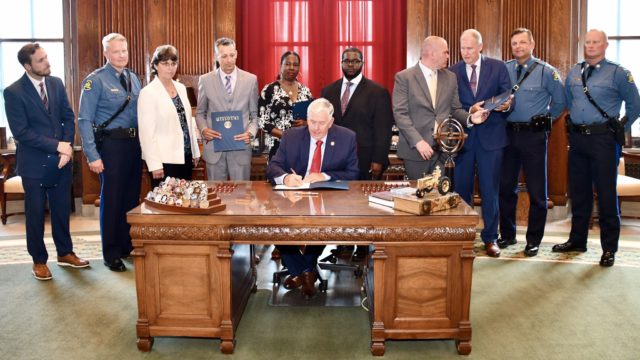
Sen. Karla May’s SB 57 would establish a Critical Incident Stress Management Program for police officers within the Department of Public Safety (DPS). Under the program, officers would receive assistance coping with stress and psychological trauma resulting from an emotionally stressful event on the job and be required to meet for a mental health check-in every three to five years.
Another section of the bill focused on struggling communities; the Economic Distress Zone Fund, also distributed by DPS, would allocate funding to nonprofit organizations offering services to areas with high crime and deteriorating infrastructure.
Lottery winners: June 29
Rep. Jay Mosley’s HB 402 changes state law to prohibit the publishing of winners’ information on the lottery website to announce their winnings. Names, addresses, and other information is shielded under Mosley’s bill. Mosley’s wife, Sen. Angela Mosley, handled the bill in the upper chamber at the end of session; lawmakers said this was the first time a bill has been carried across chambers by spouses in the Missouri Legislature.
Capitol Complex Tax Credit: June 29
Sen. Mike Bernskoetter’s SB 36 creates the Capitol Complex Tax Credit Act, allowing taxpayers who contribute to the Capitol Complex Fund a credit against state income taxes or those imposed on financial institutions. The credit would amount to half of the donation, capped at $10 million; any amount exceeding the donor’s tax liability will be carried forward for up to four years.
Banking: June 29
SB 106 from Sen. Sandy Crawford alters licensing and regulation standards for financial institutions; it also allows the Division of Finance to approve certain mergers of financial institutions and brings Missouri into line with Universal Commercial Code regulations for electronic lending devices.
065 agreements: June 29
Rep. Bruce DeGroot’s HB 345 modifies certain arbitration arrangements, known as 065 agreements. A tortfeasor — someone who commits a civil wrong against another — whose insurer denies them coverage can enter into an agreement with the victim, who limits their pursuit of the tortfeasor’s assets to certain items or forgoes it all together. The bill closes a loophole in the system in which insurers are removed from tort proceedings and allows them to be part of the legal conversation by requiring them to be notified of legal action against them in writing.
PACE reform: June 29
HB 697 from Rep. Bruce DeGroot requires municipalities taking action with a clean energy development board under PACE to notify the Division of Finance of the change, and the division would be required to conduct examinations of a board every two years. The Clean Energy Development Board would be required to work with property owners by disclosing project information, keeping them up-to-date on developments, and informing them in writing that delinquent assessments would be a lien on their property.
Licensing reforms: June 22
Rep. Derek Grier’s HB 476 began with language expanding Missouri’s licensing reciprocity laws to cover licenses issued by the military but grew to include broader licensure reforms as it progressed through the General Assembly. The final version of the bill includes a myriad of provisions, covering everything from pesticide dealers’ licenses to occupational therapists, dieticians, and architects.
HB 273 from Rep. Tom Hannegan contained similar licensing reforms; it began with language restricting the Division of Professional Registration from requiring a license for workers working in shampooing under the supervision of a licensed barber or cosmetologist. It grew over session to include licensing reciprocity for those with valid licenses from the military and licensing changes for dieticians and architects.
Language added to both bills allows pharmacists to dispense HIV post-exposure prophylaxis (PEP) medications, provided the pharmacist has completed the necessary training program. PEP treatments are used within the critical three-day period following exposure to the virus.
Insurance: June 22
SB 6 from Sen. Paul Wieland contains various provisions on insurance, clarifying the state’s petroleum tank insurance fund, licensing of insurance producers, and establishing continuing education credits for insurers.
Emerging technologies: June 22
Sen. Lincoln Hough’s SB 176 enacts regulations on personal delivery devices (PDDs), prohibiting the devices from blocking public right-of-ways or unreasonably obstructing traffic. They would also be relegated to speeds under 10 miles per hour and required to maintain a $100,000 general liability insurance policy.
Dubbed the “tiny robots” bill in the Senate, other measures were added as it rolled through the process: Another section included in the bill requires food delivery platforms to register with the Secretary of State’s Office and restricts them from using a brand’s likeness or trade name in a way that could be construed as a sponsorship of the restaurant without an agreement.
Restricting local governments’ health orders: June 15
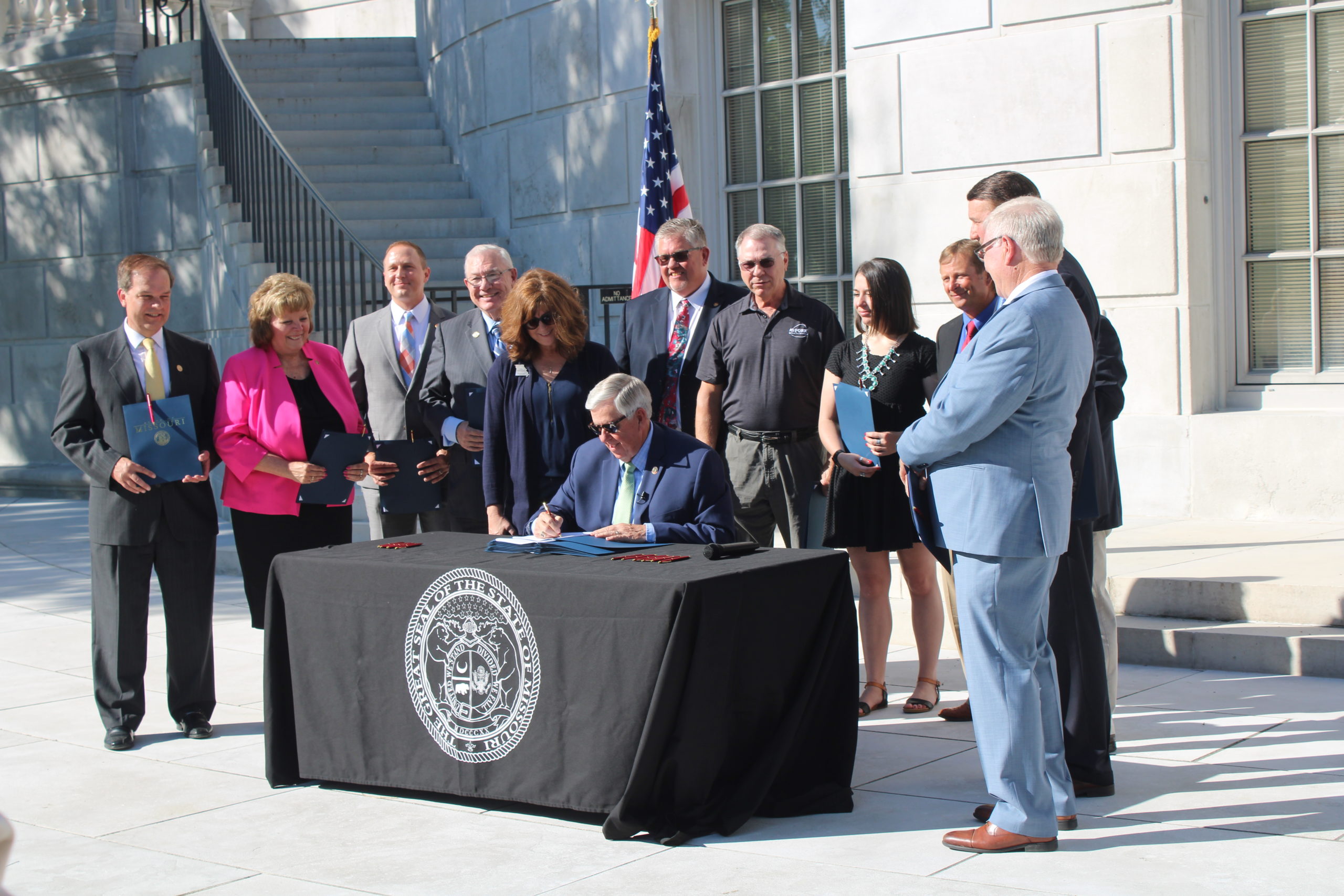
HB 271, sponsored by Speaker Pro Tem John Wiemann, prohibits local officials from issuing public health orders or restrictions leading to the closure of schools, businesses, or places of worship beyond 30 days during a six-month period amid a state of emergency. Those orders could be extended by a majority vote of the local governing body, but outside of an emergency, the limit would be set at 21 days.
It also restricts communities from requiring so-called COVID-19 vaccine passports for public transportation.
Second Amendment Preservation Act: June 12
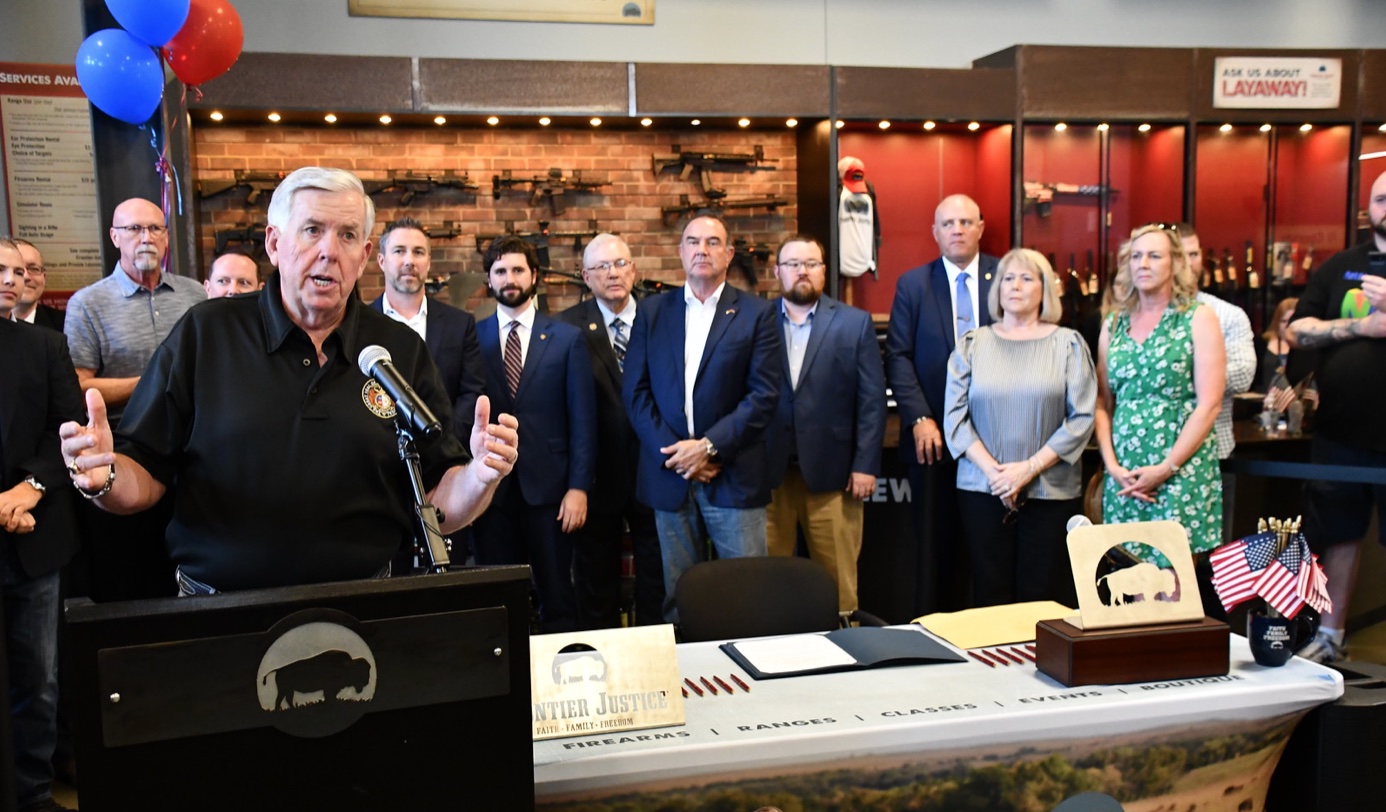
The governor signed HB 85, called SAPA, at Frontier Justice, a shooting range and gun store in Lee’s Summit. The bill declares federal gun laws that restrict gun ownership or sale void in Missouri. It also said public officers and employees cannot enforce federal firearm laws that would be void under this law and those who do could be subjected to a $50,000 penalty.
Rep. Jered Taylor, the bill’s sponsor, has said he expects the law to end up in court.
Inspection of agriculture facilities: June 10
HB 574 from Rep. Kent Haden restricts the inspection of certain agriculture facilities to just local sheriffs, law enforcement, and the departments of Agriculture and Natural Resources. Other entities could inspect the facilities if invited.
Facilities included in the bill include those raising livestock or producing eggs, milk, or other dairy products. Charter counties, except St. Charles County, as well as the cities of St. Louis and Kansas City are exempt.
East Locust Creek Reservoir Project: June 10
Parson signed off on a resolution from Sen. Dan Hegeman affirming the legislature’s support of the East Locust Creek Reservoir Project by allocating an annual maximum of $1.5 million toward its construction. The long-term commitment stems from the Multipurpose Water Resource Program Fund with a cap of $24 million.
Statewide PDMP: June 7
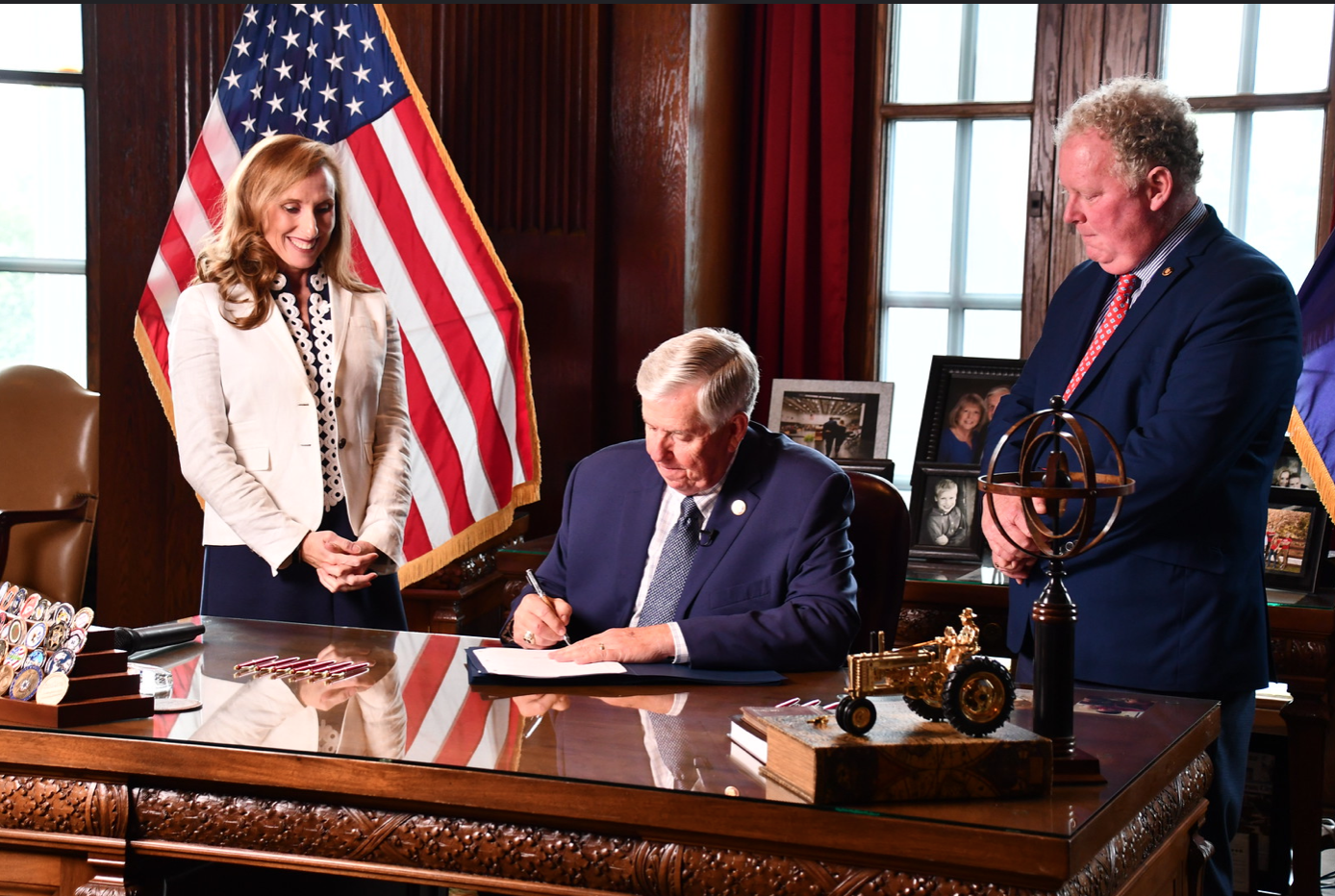
Establishing a statewide Prescription Drug Monitoring Program (PDMP) was something Sen. Holly Rehder has long championed in the statehouse, but Parson signed into law her SB 63 her first year in the Senate. Proponents say the program allows health care professionals to monitor and control the distribution of opioids and other prescriptions for their patients better. The bill establishes the Joint Oversight Task Force of Prescription Drug Monitoring within the Office of Administration.
Although the majority of the state was covered under St. Louis’ PDMP program run by a third party, Missouri was the only state without a statewide program until Parson signed Rehder’s bill.
Negro Leagues Baseball Museum license plates: May 17
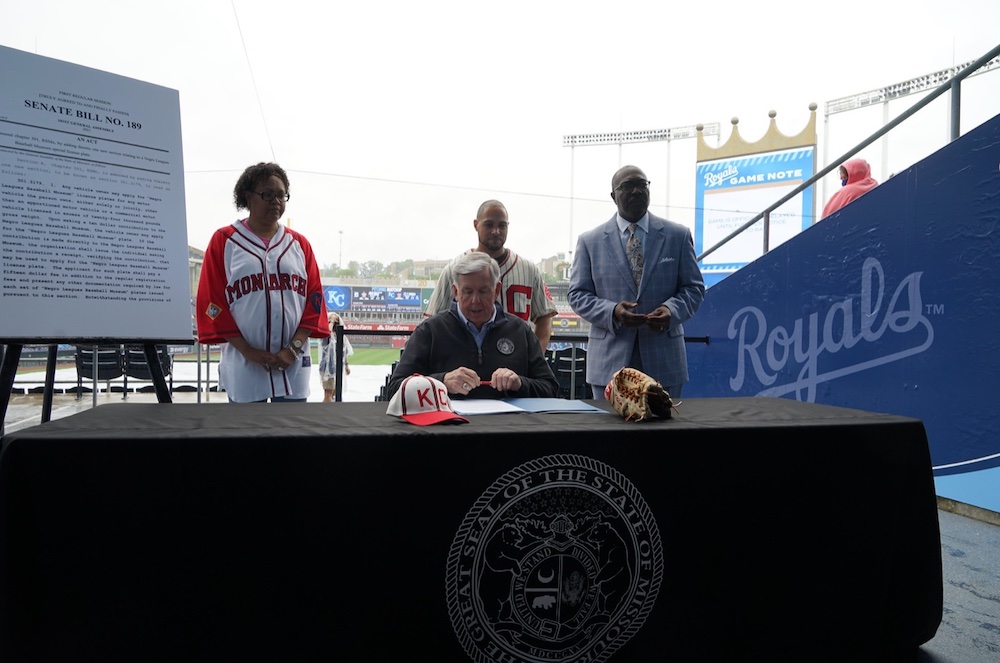
Sen. Barbara Washington’s SB 189 allows vehicle owners to apply for a special Negro Leagues Baseball Museum license plate upon donating at least $10 to the Kansas City museum. Parson held a ceremonial signing of the bill at Kauffman Stadium.
“As someone who has family members play in this league, it has always been my honor to fight for this amazing organization since I arrived in Jefferson City,” Washington said.
Supplemental budget: May 13
The supplemental budget bill included more than $2.1 billion in federal and general revenue funds for the state. In addition to funding for government operations, HB 15 also included $50 million for the Municipal Utility Emergency Loan Program, a bipartisan effort assisting local utilities reeling from the cold weather earlier in 2021. An additional provision provided $1 million for the Pretrial Witness Protection Fund approved by the legislature last year.
Adding military jobs to Missouri Works program: April 22
Sen. Dan Hegeman’s SB 2 included certain military jobs in the Missouri Works program. It allows tax credits to be awarded based on part-time and full-time civilian and military jobs created by the project.
Foster care, adoption support: April 22
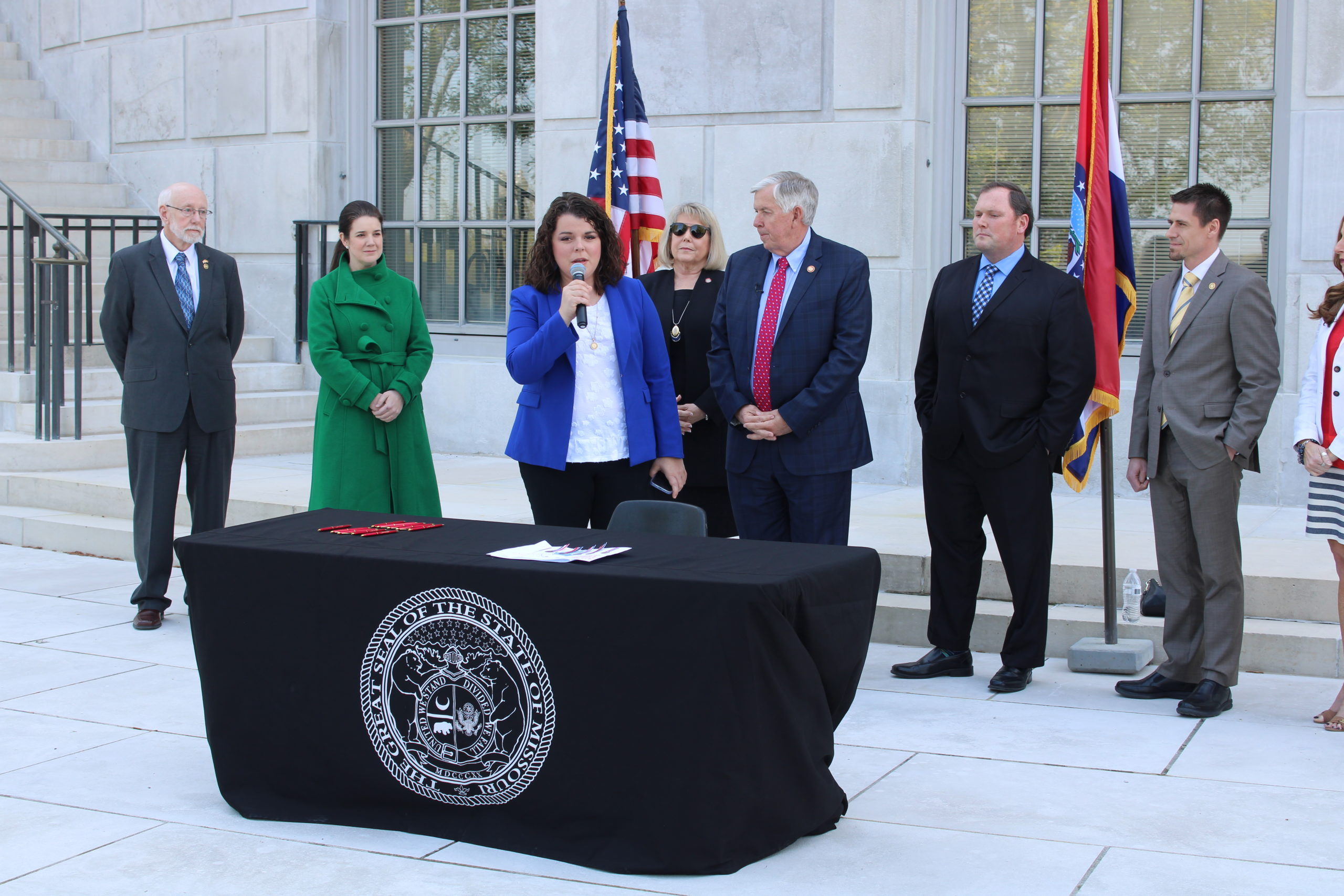
Championed by Rep. Hannah Kelly, HB 429 allows Missourians who serve as foster parents for at least six months to receive a tax deduction to cover costs associated with the process — capped at $5,000 for married couples or $2,500 for individuals.
Her HB 430 expands the opportunity for a $10,000 tax credit to those facing non-recurring adoption fees and expenses. Although the special needs requirement was eliminated, priority is given to applicants adopting children with special needs. The bill also authorized tax credits for donations made to domestic violence shelters and increased a credit for donations to maternity homes.
Emergency Rental Assistance Program: Feb. 11
The first bill of the session to be signed into law allocated more than $324 million to the Emergency Rental Assistance Program (ERAP) in federal funds. Established by Congress in December amid the COVID-19 pandemic, ERAP includes up to 12 months of assistance for rental and utility assistance.

